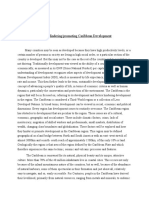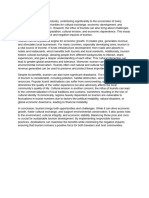0 ratings0% found this document useful (0 votes)
160 viewsIn Developing Countries
In Developing Countries
Uploaded by
Quốc Huy NguyễnTourism is promoted as a path for economic development in developing countries. However, tourism often brings more harm than good. It damages the natural environment that attracts tourists. Large resorts are built that increase beach erosion, pollution, and loss of habitats. Tourism also increases inequality as most jobs are low-paying and wealth is concentrated among foreign investors and local elites. It drives up real estate prices and displaces native populations. Local economies become dependent on tourism but it is unstable, as seen by downturns in Thailand from unrest and disasters. Tourism introduces unwanted influences on local communities and can increase issues like crime. While tourism provides some benefits, developing countries must carefully manage it to avoid significant negative consequences.
Copyright:
© All Rights Reserved
Available Formats
Download as DOCX, PDF, TXT or read online from Scribd
In Developing Countries
In Developing Countries
Uploaded by
Quốc Huy Nguyễn0 ratings0% found this document useful (0 votes)
160 views3 pagesTourism is promoted as a path for economic development in developing countries. However, tourism often brings more harm than good. It damages the natural environment that attracts tourists. Large resorts are built that increase beach erosion, pollution, and loss of habitats. Tourism also increases inequality as most jobs are low-paying and wealth is concentrated among foreign investors and local elites. It drives up real estate prices and displaces native populations. Local economies become dependent on tourism but it is unstable, as seen by downturns in Thailand from unrest and disasters. Tourism introduces unwanted influences on local communities and can increase issues like crime. While tourism provides some benefits, developing countries must carefully manage it to avoid significant negative consequences.
Original Description:
Tourism Economic
Copyright
© © All Rights Reserved
Available Formats
DOCX, PDF, TXT or read online from Scribd
Share this document
Did you find this document useful?
Is this content inappropriate?
Tourism is promoted as a path for economic development in developing countries. However, tourism often brings more harm than good. It damages the natural environment that attracts tourists. Large resorts are built that increase beach erosion, pollution, and loss of habitats. Tourism also increases inequality as most jobs are low-paying and wealth is concentrated among foreign investors and local elites. It drives up real estate prices and displaces native populations. Local economies become dependent on tourism but it is unstable, as seen by downturns in Thailand from unrest and disasters. Tourism introduces unwanted influences on local communities and can increase issues like crime. While tourism provides some benefits, developing countries must carefully manage it to avoid significant negative consequences.
Copyright:
© All Rights Reserved
Available Formats
Download as DOCX, PDF, TXT or read online from Scribd
Download as docx, pdf, or txt
0 ratings0% found this document useful (0 votes)
160 views3 pagesIn Developing Countries
In Developing Countries
Uploaded by
Quốc Huy NguyễnTourism is promoted as a path for economic development in developing countries. However, tourism often brings more harm than good. It damages the natural environment that attracts tourists. Large resorts are built that increase beach erosion, pollution, and loss of habitats. Tourism also increases inequality as most jobs are low-paying and wealth is concentrated among foreign investors and local elites. It drives up real estate prices and displaces native populations. Local economies become dependent on tourism but it is unstable, as seen by downturns in Thailand from unrest and disasters. Tourism introduces unwanted influences on local communities and can increase issues like crime. While tourism provides some benefits, developing countries must carefully manage it to avoid significant negative consequences.
Copyright:
© All Rights Reserved
Available Formats
Download as DOCX, PDF, TXT or read online from Scribd
Download as docx, pdf, or txt
You are on page 1of 3
In developing countries, collectively referred to as the Global South, tourism
is seen as a fast and effective means of economic development. This is
especially true for countries that lack exportable natural resources, but
possess plenty of natural attractions, such as beaches, mountains, lush
forests, and jungles. As a means of maximising the economic benefits for
their citizens, such countries are encouraged to capitalise on these
attractions by promoting tourism and developing a suitable tourism
infrastructure. Many countries are taking up this opportunity and there has
been a noticeable tendency for developing nations to invest heavily in
expanding their tourism industries.
In reality, however, tourism can cause extensive damage to the natural world.
It can therefore bring more harm than good to the communities it is supposed
to serve. Ecotourism, for example, is designed to take advantage of a
locale’s natural beauty to attract ‘green’ travellers, but ironically the
environment is often sacrificed to accommodate them. Every year, hordes of
tourists flock to St. Lucia to take in its gorgeous scenery, scuba dive among
the coral reefs in its clear waters, and explore the rainforests of the island’s
interior. While well-managed scuba diving trips and excursions into the
rainforest may not directly disturb the native wildlife and flora, the resorts
built to accommodate ecotourists have caused significant increases in beach
erosion, and the demand for boating transport has resulted in the loss of
mangrove swamps and increased pollution of the marine environment
(Nagle, 1999).
Another problem is the income disparity that almost always occurs as a result
of tourism in underdeveloped nations. It starts with governments investing
heavily in infrastructure such as roads, airports, public transportation and the
like. The money to fund these projects comes out of taxpayers’ wallets, with
the idea that the investment will create jobs and opportunities for the local
population, but that is rarely the case. Contracts to build hotels, resorts, parks,
and the restaurants are often given to the wealthy businesspeople who
exploit local laborers in order to increase profit margins. Then, when the
establishments open, the same pattern occurs with hired staff who work for
wages barely above minimum wage. Thus, the rich get richer while the
increasing wealth gap forces the lower socioeconomic classes into deeper
poverty.
Moreover, overseas investors make it impossible for small, local businesses
to compete. International chains are the first in line to bid for spaces on beach
front property in almost every country of the world. They pay premium prices
to secure their stronghold in developing tourist sectors. This has happened
in Costa Rica, where foreign individuals or companies own 65 per cent of
Costa Rica’s GDP, local businesses have not benefited from this thriving
industry.
These trends affect the private real estate market as well. Once a place
becomes popular with foreigners, there’s a rush to purchase vacation homes,
dramatically increasing property values and displacing the native inhabitants.
This is evident to anyone who has travelled along the coast of Spain or to
any of the Greek islands. A San Francisco State University study on Belize
revealed that as result of tourism development, local prices have increased
overall by around 8 per cent in the past decade alone. Some countries, such
as Thailand, have made foreign direct ownership of property illegal, which
has alleviated some of these effects. However, even with such rigid
regulations, people still find a way to evade the laws by coordinating with
Thai cicizens or businesses to purchase property. In the end, an inflated real
estate market is inevitable, as are increases in other basic costs such as
food, water, clothing, and daily necessities.
Regardless of who is making the profits, though, local populations become
dependent on influx of tourist cash, despite the hazards. In Gambia, for
instance, 30 per cent of the workforce depends directly or indirectly on
tourism, and in the maldives, this figure is striking 83 per cent. When a
substantial quantity of available jobs revolves around tourism, countries
often neglect developing other sectors that could decrease that dependency.
While this may not seem problematic, it quickly becomes so when
unforeseen events threaten the stability of a country and scare off tourists.
This has happened to Thailand several times over the past decade, with both
civil unrest and natural disasters resulting in recessions caused by dramatic
decreases in tourism.
Economic aside, there are also social consequences of high growth tourism
for local communities; along with foreign influences can come unwelcome
behavior and activities. This can simply be undesirable habits or mannerisms
that contradict local customs. But it can also be more serious, such as
increases in drug use, alcohol abuse, and petty crime, all of which often
accompany tourism. Even if locals don’t participate directly in such
misconduct, they are bound to be adversely affected by a rise in criminality,
and will often report a decline in their sense of personal security and quality
of life because of it. Thus, the development of a tourism industry can be a
mixed blessing, bringing developing countries an influx of investment,
visitors from around the world, and a variety of intractable problems.
Government in these countries must do their best to effectively regulate and
manage tourism, so that the benefits can be widespread, and the negative
effects can be avoided or minimised.
You might also like
- Essay OvertourismDocument2 pagesEssay OvertourismpolinaNo ratings yet
- Toll Regulatory BoardDocument31 pagesToll Regulatory BoardJeng PionNo ratings yet
- Travelling, Industry, Ist Pros and Cons, ConclusionDocument8 pagesTravelling, Industry, Ist Pros and Cons, ConclusionTomáš PokludaNo ratings yet
- Pros and Cons of TourismDocument5 pagesPros and Cons of TourismQuốc Anh TrầnNo ratings yet
- REAL TourismDocument9 pagesREAL TourismMy Chi TongNo ratings yet
- Impact of Tourism On The DestinationDocument7 pagesImpact of Tourism On The DestinationMogomotsiNo ratings yet
- The Surge of OverDocument8 pagesThe Surge of Overwyltox.mainNo ratings yet
- Section7 ImpactsofTourismDocument11 pagesSection7 ImpactsofTourismFlorrie Jhune BuhaweNo ratings yet
- Factors Hindering/promoting Caribbean Development: Name: Reuben Burton Date: Feb. 10, 2011 Subject: Caribbean StudiesDocument6 pagesFactors Hindering/promoting Caribbean Development: Name: Reuben Burton Date: Feb. 10, 2011 Subject: Caribbean StudiesNebuer BurtonNo ratings yet
- GP IR First SubmmisionDocument2 pagesGP IR First Submmisiony.y.k.k.XDNo ratings yet
- What Are The Positive and Negative Effects of Tourism On CultureDocument3 pagesWhat Are The Positive and Negative Effects of Tourism On CultureMia Sam100% (1)
- Macro KimeDocument3 pagesMacro KimelacambrakarissaNo ratings yet
- Wediombo ExistenceDocument1 pageWediombo ExistenceMuhamad ReynaldiNo ratings yet
- International tourism has brought enormous benefit to many placesDocument2 pagesInternational tourism has brought enormous benefit to many placesthuydungglikeboNo ratings yet
- Economic Impacts of TourismDocument5 pagesEconomic Impacts of TourismMIlan MudricNo ratings yet
- Half Background of the StudyDocument4 pagesHalf Background of the StudyC ian BumanghatNo ratings yet
- TourismDocument2 pagesTourismAnonymous rfeqISNo ratings yet
- Icon OriginalDocument1 pageIcon OriginalSri SummerNo ratings yet
- Understanding Culturally Sustainable Tourism An Observed Comparison of The Models Followed by Kerala and GoaDocument16 pagesUnderstanding Culturally Sustainable Tourism An Observed Comparison of The Models Followed by Kerala and GoaMadalina CristilNo ratings yet
- Travel and Transport Advantages and DisadvantagesDocument3 pagesTravel and Transport Advantages and DisadvantagesYaroslava SokurNo ratings yet
- UU114 Tourism EssayDocument15 pagesUU114 Tourism Essayshivneelsingh987No ratings yet
- Andrew Liolea I D: 7 0 0 0 3 1 2 4 5Document5 pagesAndrew Liolea I D: 7 0 0 0 3 1 2 4 5Lioleafafoi AndrewNo ratings yet
- About Tourism IndustryDocument7 pagesAbout Tourism IndustryHyung BaeNo ratings yet
- Iii. Tourism: A. Introduction 1. General ConsiderationsDocument14 pagesIii. Tourism: A. Introduction 1. General ConsiderationsmozziahNo ratings yet
- Travel and Transport Advantages and DisadvantagesDocument3 pagesTravel and Transport Advantages and DisadvantagesYaroslava SokurNo ratings yet
- Sustainable Tourism in Small IslandsDocument12 pagesSustainable Tourism in Small IslandsPawan CoomarNo ratings yet
- Tourism-Advantages and DisadvantagesDocument1 pageTourism-Advantages and DisadvantagesSergiu PavelNo ratings yet
- Ecotourism: Society & GovernanceDocument7 pagesEcotourism: Society & GovernancePrecious PhutitsarengNo ratings yet
- Nowadays It Is More Convenient and Easier For People To Travel To Other Countries. Is It A Positive or Negative Development?Document1 pageNowadays It Is More Convenient and Easier For People To Travel To Other Countries. Is It A Positive or Negative Development?SallyNo ratings yet
- Reflection Paper About Tourism ImpactsDocument5 pagesReflection Paper About Tourism ImpactsRenz John AgcaoiliNo ratings yet
- 5Document1 page5Nhật BìnhNo ratings yet
- Tourism and Sustainable DevelopmentDocument16 pagesTourism and Sustainable DevelopmentmugdhachNo ratings yet
- 12 TourismDocument8 pages12 TourismGisselyNo ratings yet
- Module - Fundamentals in Tourism BusinessDocument64 pagesModule - Fundamentals in Tourism Businesspv2c7pspmnNo ratings yet
- Lecture Notes 2aDocument35 pagesLecture Notes 2aLiviu IordacheNo ratings yet
- Is Overtourism A ProblemDocument6 pagesIs Overtourism A ProblemAZIZNo ratings yet
- Major Case Study 7.1Document4 pagesMajor Case Study 7.1Ralph Granil Quiero0% (1)
- Positive and Negative Effects of EducationDocument2 pagesPositive and Negative Effects of Educationobrique quinn jeggerNo ratings yet
- Geography of Tourism and Recreartion: Hges 311 Assignment 1 (Due Date - 25 February 2022)Document9 pagesGeography of Tourism and Recreartion: Hges 311 Assignment 1 (Due Date - 25 February 2022)tawandaNo ratings yet
- Tourism Promotes The Economy But Degrades The EnvironmentDocument4 pagesTourism Promotes The Economy But Degrades The EnvironmentLin YunNo ratings yet
- Gabby Olsen U0801999 5/3/15 Ecotourism Research PaperDocument14 pagesGabby Olsen U0801999 5/3/15 Ecotourism Research Paperapi-325420132No ratings yet
- Globalization in Tourism IndustryDocument6 pagesGlobalization in Tourism IndustryAna LuisaNo ratings yet
- Understanding The World of TourismDocument6 pagesUnderstanding The World of TourismSara Batool100% (1)
- International Traveling Band 8.0Document1 pageInternational Traveling Band 8.0itsbncdbNo ratings yet
- Is sustainable tourism actually sustainable (1)Document2 pagesIs sustainable tourism actually sustainable (1)cebikif602No ratings yet
- Coping With SeasonalityDocument10 pagesCoping With SeasonalityFrey Den Calzadora RodioNo ratings yet
- Economic Impacts of Tourism - Article AssignmentDocument8 pagesEconomic Impacts of Tourism - Article AssignmentMahbubul Hassan MimNo ratings yet
- Week 15Document6 pagesWeek 15Aldrene John BendoNo ratings yet
- Tourism: An EssayDocument1 pageTourism: An Essaycassuloantonella1No ratings yet
- Current Issues and Trends in Hospitality and Tourism IndustryDocument8 pagesCurrent Issues and Trends in Hospitality and Tourism IndustryPeralta, Miguel Angel G.100% (1)
- Geography Essay - Tertiary Industry: TourismDocument2 pagesGeography Essay - Tertiary Industry: TourismClara SooNo ratings yet
- 5% PresetationDocument2 pages5% PresetationJamar SalmonNo ratings yet
- What Is Sustainable TourismDocument7 pagesWhat Is Sustainable TourismChucksz SilanNo ratings yet
- English - Pro & Cons International TourismDocument45 pagesEnglish - Pro & Cons International TourismSergiu SergeNo ratings yet
- Tourism Essay 2Document14 pagesTourism Essay 2shivneelsingh987No ratings yet
- International TourismDocument1 pageInternational TourismNguyễn HằngNo ratings yet
- Tourism-Development-In-Pacific-Possible-Or-Improbablle - MoodleDocument2 pagesTourism-Development-In-Pacific-Possible-Or-Improbablle - Moodlefaith.s.vanvirNo ratings yet
- Lesson 4 Shocks and Threats To The Tourism Industry 1Document5 pagesLesson 4 Shocks and Threats To The Tourism Industry 1aprilbaino4No ratings yet
- Tourism in Third World DevelopmentDocument12 pagesTourism in Third World Developmentesplana.jhonfhiel.carasNo ratings yet
- Luyen Tap Chuyen Sau Tieng Anh 8 HayDocument144 pagesLuyen Tap Chuyen Sau Tieng Anh 8 HayQuốc Huy NguyễnNo ratings yet
- 03Document9 pages03Quốc Huy NguyễnNo ratings yet
- Do You WearDocument2 pagesDo You WearQuốc Huy NguyễnNo ratings yet
- In Modern Times People Under More Stress Than Ever This Has A Negative Impact On Their WellDocument1 pageIn Modern Times People Under More Stress Than Ever This Has A Negative Impact On Their WellQuốc Huy NguyễnNo ratings yet
- Presentation 1Document15 pagesPresentation 1Quốc Huy NguyễnNo ratings yet
- Mgea06 Final 2009wDocument12 pagesMgea06 Final 2009wexamkillerNo ratings yet
- 4 March Capstone ProjectDocument28 pages4 March Capstone ProjectCarl BerryNo ratings yet
- Module 1 Business Environment and Managerial AccountingDocument43 pagesModule 1 Business Environment and Managerial AccountingadeepcdmaNo ratings yet
- Sanjay BakshiDocument24 pagesSanjay BakshiPraneeth G SNo ratings yet
- Hutch To VodafoneDocument23 pagesHutch To Vodafonenayan_vetNo ratings yet
- Chapter 3 Problems AnswersDocument11 pagesChapter 3 Problems AnswersOyunboldEnkhzayaNo ratings yet
- Guide To Engineering EconomicsDocument94 pagesGuide To Engineering Economicsagricultural and biosystems engineeringNo ratings yet
- Memo For The Movement: Republicans Should Support President Trump's 2018 Budget ProposalDocument6 pagesMemo For The Movement: Republicans Should Support President Trump's 2018 Budget ProposalCitizens UnitedNo ratings yet
- Cash Flow Analysis Lyst5937Document5 pagesCash Flow Analysis Lyst5937Vibhav SinghNo ratings yet
- FMDQ Codified Rule Book Money MarketDocument25 pagesFMDQ Codified Rule Book Money MarketOladipupo Mayowa PaulNo ratings yet
- Perf Audit Manual enDocument93 pagesPerf Audit Manual enBasit AliNo ratings yet
- Integrated Project Delivery Methodology - ArchDailyDocument5 pagesIntegrated Project Delivery Methodology - ArchDailySreekanth PS0% (1)
- Mandatory Audit RotationDocument19 pagesMandatory Audit RotationSheylla Sagita RizkyNo ratings yet
- International Equity MarketsDocument32 pagesInternational Equity MarketsSachin PadolNo ratings yet
- History RolexDocument2 pagesHistory Rolexacademic001100% (1)
- FAM Text BookDocument2 pagesFAM Text BookSumitNo ratings yet
- Final Accounts of Banking Companies (Problem 5)Document4 pagesFinal Accounts of Banking Companies (Problem 5)Rohit VishwakarmaNo ratings yet
- 4.1 11 Steps To Create World Class OrganizationsDocument19 pages4.1 11 Steps To Create World Class Organizationsavnijain1987No ratings yet
- Unit 3 Review Practice Set (Modules 16-21)Document9 pagesUnit 3 Review Practice Set (Modules 16-21)Samuel JayNo ratings yet
- Lenovo - A Case Study.Document36 pagesLenovo - A Case Study.Soumil Prakash100% (1)
- Asian PaintsDocument35 pagesAsian PaintsAishNo ratings yet
- Third Amended and Restated Certificate of IncorporationDocument5 pagesThird Amended and Restated Certificate of Incorporationjan012583No ratings yet
- THC001 - Chapter 4Document3 pagesTHC001 - Chapter 4Allyn BalabatNo ratings yet
- Basics of Direct TaxesDocument41 pagesBasics of Direct TaxesrokuveNo ratings yet
- R&D Project Grant Cost TemplateDocument9 pagesR&D Project Grant Cost Templatealfaroq_almsry100% (1)
- Investor Investmetn in Stock MarketDocument41 pagesInvestor Investmetn in Stock MarketSamuel DavisNo ratings yet
- JK LaxmiDocument7 pagesJK LaxmiRockyBalboaaNo ratings yet
- Final Report On Dividend PolicyDocument38 pagesFinal Report On Dividend PolicyMilan Sonkar75% (4)
- India and World Economy: Search For Self-Reliance Vijay Laxman KelkarDocument9 pagesIndia and World Economy: Search For Self-Reliance Vijay Laxman KelkarrajshreeNo ratings yet






























































































